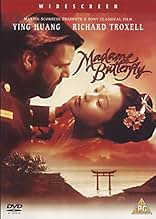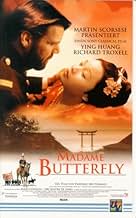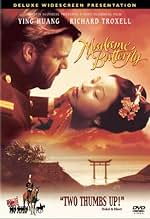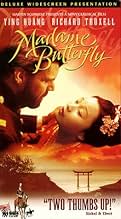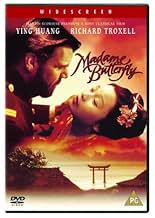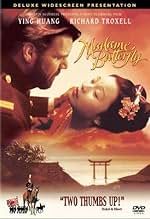Füge eine Handlung in deiner Sprache hinzuThe story of a young geisha who falls madly in love with an american captain that travels all around the world collecting hearts.The story of a young geisha who falls madly in love with an american captain that travels all around the world collecting hearts.The story of a young geisha who falls madly in love with an american captain that travels all around the world collecting hearts.
- Regie
- Drehbuch
- Hauptbesetzung
- Auszeichnungen
- 1 Gewinn & 1 Nominierung insgesamt
Empfohlene Bewertungen
The first time I saw Madama Butterfly was early August 2020, as a 2017 performance at the Royal Opera House. I loved the music so much I decided to watch this version as well. This movie has taken a realist approach to depicting the story by Asian singers for the Asian roles. This choice was slightly at the cost of operatic quality, but if for the sake for top-notch voices the cast had been whitewashed and replaced by singers twice as old, I would have skipped it. This is a movie, not a live performance.
Ying Huang (Cio-cio-san/Butterfly) played the affection-starved yet goodhearted woman beautifully, if not a little stiffly at times. Richard Troxell (Pinkerton, the American naval officer) played the entitled "playboy" so convincingly I had the urge to slap him through the screen. Jingma Fan (Goro) played the marriage broker; in this version he's not only oppertunistic but also slightly malicious which was surprising but Fan played it well.
The visuals in this movie were unexpectedly beautiful. Instead of depicting the bustling harbour city of Nagasaki they chose a more rural setting with thatched houses; as it was shot in Tunisia the village is dotted with olive trees rather than pine trees. This was probably done for economic reasons, yet it never feels fake: the houses look real and lively, the gardens are lined with flowers, people are fishing for mussels in the surf. The costumes and interiors were pretty as well.
However, I think the director took too many artistic liberties. By inserting flashbacks and flash-forwards and making it appear as if days or even weeks pass between different events he interrupted the pacing of the music. He also left out about 10 minutes of music at the beginning of Act 3 ("Oh Eh ! Oh Eh !") The cinematography was pretty during shots of landscapes and outside scenes, but during interior scenes the mostly static shots tended to make the rooms look cramped.
Despite good singers and beautiful set design, its shortcomings on both the cinematic and operatic side make this film fall short of being great. However, it is still good and I can recommend this to everyone.
Ying Huang (Cio-cio-san/Butterfly) played the affection-starved yet goodhearted woman beautifully, if not a little stiffly at times. Richard Troxell (Pinkerton, the American naval officer) played the entitled "playboy" so convincingly I had the urge to slap him through the screen. Jingma Fan (Goro) played the marriage broker; in this version he's not only oppertunistic but also slightly malicious which was surprising but Fan played it well.
The visuals in this movie were unexpectedly beautiful. Instead of depicting the bustling harbour city of Nagasaki they chose a more rural setting with thatched houses; as it was shot in Tunisia the village is dotted with olive trees rather than pine trees. This was probably done for economic reasons, yet it never feels fake: the houses look real and lively, the gardens are lined with flowers, people are fishing for mussels in the surf. The costumes and interiors were pretty as well.
However, I think the director took too many artistic liberties. By inserting flashbacks and flash-forwards and making it appear as if days or even weeks pass between different events he interrupted the pacing of the music. He also left out about 10 minutes of music at the beginning of Act 3 ("Oh Eh ! Oh Eh !") The cinematography was pretty during shots of landscapes and outside scenes, but during interior scenes the mostly static shots tended to make the rooms look cramped.
Despite good singers and beautiful set design, its shortcomings on both the cinematic and operatic side make this film fall short of being great. However, it is still good and I can recommend this to everyone.
I love Madame Butterfly so naturally I wanted to see this 1995 film. And I am so glad I saw it, as it is a beautiful and excellent film of a wonderful opera. At hindsight, the opera's story is rather implausible, however the love story and telling of it is timeless, Cio Cio San is a charming lead character and the music(my favourites being Humming Chorus, Flower Duet, Un Bel Di Vedremo and particularly the act 1 love duet) is among Puccini's very finest.
There are only two things I wasn't crazy about here. One was showing the Gonze as a supernatural figure and floating in mid air, I personally found it unnecessary and felt it distracted from the drama of that particular moment. The other was the use of black and white footage of old Japan. In a way it was interesting, but I for one wasn't entirely sure whether it fitted with the scene(Humming Chorus in this case).
However, this film is visually stunning, with sweeping camera shots, stunning scenery and evocative costumes. The beautiful music is beautifully performed by the orchestra and is conducted with precision and sensitivity. When it comes to the acting/staging, the love duet was genuinely affecting and the Flower Duet blended and acted beguilingly, but the revelations were Un Bel Di Vedremo and the final scene, both of which moved me to tears.
The acting and singing work hugely too. Ying Huang amazed me with her beauty and appealing voice, and Richard Troxell is an excellent Pinkerton, never trying too hard to make us hate him. Ning Liang is one of the most sympathetic Suzukis I know of, and Sharpless shapes his music beautifully. Goro also is more cynical and less bumbling, something that I loved and found refreshing.
Overall, excellent film and one where a box of tissues by your side is necessary. 8/10 Bethany Cox
There are only two things I wasn't crazy about here. One was showing the Gonze as a supernatural figure and floating in mid air, I personally found it unnecessary and felt it distracted from the drama of that particular moment. The other was the use of black and white footage of old Japan. In a way it was interesting, but I for one wasn't entirely sure whether it fitted with the scene(Humming Chorus in this case).
However, this film is visually stunning, with sweeping camera shots, stunning scenery and evocative costumes. The beautiful music is beautifully performed by the orchestra and is conducted with precision and sensitivity. When it comes to the acting/staging, the love duet was genuinely affecting and the Flower Duet blended and acted beguilingly, but the revelations were Un Bel Di Vedremo and the final scene, both of which moved me to tears.
The acting and singing work hugely too. Ying Huang amazed me with her beauty and appealing voice, and Richard Troxell is an excellent Pinkerton, never trying too hard to make us hate him. Ning Liang is one of the most sympathetic Suzukis I know of, and Sharpless shapes his music beautifully. Goro also is more cynical and less bumbling, something that I loved and found refreshing.
Overall, excellent film and one where a box of tissues by your side is necessary. 8/10 Bethany Cox
Unfortunatly , their lips aren't moving right. So their either lip synching or it's been dubbed. Richard Troxell's the best in this. His emotion drips off the screen. So's his cohort. The actress playing butterfly looks and acts too old for the part. I personally loved this film. But as they are singing in opera terms, many might not appreciate it. It's up to you. (example: I found it to be uplifting and another person found it to be more depressing than The Refelecting Skin.) So what you take from it is entirely up to you. :)
9/10 (can't give it a full 10 because of the dubbing/lip synch problems.
Quality: 9/10 Entertainment: 10/10 (how can you not. with such powerful singing) Replayable: 6/10
9/10 (can't give it a full 10 because of the dubbing/lip synch problems.
Quality: 9/10 Entertainment: 10/10 (how can you not. with such powerful singing) Replayable: 6/10
Filming an opera, especially one as globally well known as Puccini's, is a daunting challenge because so much of what has been composed and dramatized has been designed specifically for the stage of an opera hall. On one end, there have been superb video recordings of great stage performances, such as the 2005 Salzburg Festival production of Verdi's "La Traviata" with Anna Netrebko and Rolando Villazón. On the other end are adaptations that try to cinematize operas with real locations, though most often with some deficiencies, for example, Barbara Willis Sweete's 2002 production of Gounod's "Roméo et Juliette" with Roberto Alagna and Angela Gheorghiu frankly too old to play the young lovers. In the latter camp, this 1995 French-financed film shows director Frédéric Mitterand making a valid attempt toward authenticity, but he misses a key opportunity to open up the visual and sensory possibilities beyond the obvious. Despite the creative use of Tunisian locations to replicate early 1900's Japan, the result still feels oddly stage-bound and dramatically inert despite some bravura musical moments.
The heavily masochistic story is familiar. In 1904, U.S. naval officer Lieutenant Pinkerton, while stationed in Nagasaki, marries a teenaged girl named Cio-Cio San. Despite their affections for one another, he cavalierly sees the marriage as one of convenience, and when his assignment is done, he goes back to the U.S. with no intention of returning. Cio-Cio San, however, takes the relationship so seriously that she sacrifices her family for the marriage. Three years pass by, but it does not deter Cio-Cio San from hoping for Pinkerton's return since it turns out that she has borne their son in the meantime. Finally, a ship arrives and Cio-Cio San correctly surmises that he is on it. However, tragedy ensues since Pinkerton has remarried in the interim and wants to take his son back to America with him and his new American wife. Taken on the surface, the opera seems defiantly anti-American in showing Pinkerton to be a superficial cad despite how remorseful he may appear at the end, but it also takes a sideswipe at the purportedly subservient nature of Japanese women since her own self-delusions are so intractable. Regardless, the heartstrings are pulled at the right moments when the opera is acted in the manner Puccini intended.
Chinese soprano Ying Huang was chosen over hundreds of young singers for the title role, and while she does not really look Japanese, she displays a sweetly supple voice as she performs the dramatic arc of Cio-Cio San's plight. However, as a screen actress, Huang lacks a certain lightness in the early romantic scenes and seems a bit at sea with the later melodramatic moments. Even though she lacks the plummy depths of a Callas or a Tebaldi, she provides affecting renditions of the two pivotal arias, "Un bel dì vedremo" when Cio-Cio San looks out into the harbor awaiting Pinkerton's return, and her death scene, "Con onor muore". As Pinkerton, admittedly a tough role to play much less sympathize with, American tenor Richard Traxell matches Huang well vocally, but again his acting seems a bit shallow as he only shows unrelenting bravado in the first act and guilt-ridden regret in the third. The others in the cast fare better since there are less dramatic demands on them, in particular, American baritone Richard Cowan as the sympathetic consul Sharpless and acclaimed Chinese mezzo-soprano Liang Ning as the maid Suzuki.
Despite some nice art direction, the visual presentation feels somewhat flat when colors should really pop and the camera be more mobile. There are also some scenes that simply do not work such as having Cio-Cio San's uncles come to banish her from the family in an airborne fashion and the use of anachronistic Japanese newsreel footage as a musical bridge. However, the sound itself is fine with superb orchestral support from the Orchestre de Paris under the baton of James Conlon. There is one extra with the 2002 DVD, a 12-minute making-of featurette which really amounts to following Huang from her initial audition through the actual production.
The heavily masochistic story is familiar. In 1904, U.S. naval officer Lieutenant Pinkerton, while stationed in Nagasaki, marries a teenaged girl named Cio-Cio San. Despite their affections for one another, he cavalierly sees the marriage as one of convenience, and when his assignment is done, he goes back to the U.S. with no intention of returning. Cio-Cio San, however, takes the relationship so seriously that she sacrifices her family for the marriage. Three years pass by, but it does not deter Cio-Cio San from hoping for Pinkerton's return since it turns out that she has borne their son in the meantime. Finally, a ship arrives and Cio-Cio San correctly surmises that he is on it. However, tragedy ensues since Pinkerton has remarried in the interim and wants to take his son back to America with him and his new American wife. Taken on the surface, the opera seems defiantly anti-American in showing Pinkerton to be a superficial cad despite how remorseful he may appear at the end, but it also takes a sideswipe at the purportedly subservient nature of Japanese women since her own self-delusions are so intractable. Regardless, the heartstrings are pulled at the right moments when the opera is acted in the manner Puccini intended.
Chinese soprano Ying Huang was chosen over hundreds of young singers for the title role, and while she does not really look Japanese, she displays a sweetly supple voice as she performs the dramatic arc of Cio-Cio San's plight. However, as a screen actress, Huang lacks a certain lightness in the early romantic scenes and seems a bit at sea with the later melodramatic moments. Even though she lacks the plummy depths of a Callas or a Tebaldi, she provides affecting renditions of the two pivotal arias, "Un bel dì vedremo" when Cio-Cio San looks out into the harbor awaiting Pinkerton's return, and her death scene, "Con onor muore". As Pinkerton, admittedly a tough role to play much less sympathize with, American tenor Richard Traxell matches Huang well vocally, but again his acting seems a bit shallow as he only shows unrelenting bravado in the first act and guilt-ridden regret in the third. The others in the cast fare better since there are less dramatic demands on them, in particular, American baritone Richard Cowan as the sympathetic consul Sharpless and acclaimed Chinese mezzo-soprano Liang Ning as the maid Suzuki.
Despite some nice art direction, the visual presentation feels somewhat flat when colors should really pop and the camera be more mobile. There are also some scenes that simply do not work such as having Cio-Cio San's uncles come to banish her from the family in an airborne fashion and the use of anachronistic Japanese newsreel footage as a musical bridge. However, the sound itself is fine with superb orchestral support from the Orchestre de Paris under the baton of James Conlon. There is one extra with the 2002 DVD, a 12-minute making-of featurette which really amounts to following Huang from her initial audition through the actual production.
This really is a great opera movie. All the actors have the right age and -when it comes to appearance- the right "beauty". Butterfly is a young girl in the story, and in this movie she looks as one (and she is only in her early twenties). Nevertheless she does all the singing herself. She has won prizes in opera competitions and is very convincing. She is from China, not Japan, and has the perfect voice for the part. Who would ever find this story believable with a 40-years old soprano? Now with this young Asian actress/singer one is moved as one should be. Not only the singing, but also the emotions are clear and real. This could never be achieved in play-back from a different singer. All the other main characters are (very) good actors and sing their own parts (very well). The setting is beautiful, though not in Japan, but in Tunisia (I read afterwards). The orchestra plays well (under James Conlon). In fact everything is good. Only a few minor parts are sung by different persons than the (Asian) actors. Summarizing: The best Butterfly I have ever seen and probably the best I will ever see from now on.
WUSSTEST DU SCHON:
- WissenswertesThe entire Japanese village set and house were built in Tunisia, Northern Africa.
- PatzerDuring Act 2 and Act 3, a blooming wisteria is shown to be growing along the house's roof above the porch. In reality wisteria would not have been grown here as the house's structure would have been unsuitable for it. Wisteria is a plant known to become heavy and massive with age; it would have been grown along a sturdy trellis or stone wall instead as not to cause any damage.
- Zitate
Lieutenant Benjamin Franklin Pinkerton: She's like a porcelain doll. She sets me on fire.
Top-Auswahl
Melde dich zum Bewerten an und greife auf die Watchlist für personalisierte Empfehlungen zu.
- How long is Madame Butterfly?Powered by Alexa
Details
- Erscheinungsdatum
- Herkunftsländer
- Sprache
- Auch bekannt als
- Madame Butterfly, de Frederick Mitterand
- Drehorte
- Produktionsfirmen
- Weitere beteiligte Unternehmen bei IMDbPro anzeigen
Box Office
- Bruttoertrag in den USA und Kanada
- 65.196 $
- Eröffnungswochenende in den USA und in Kanada
- 6.027 $
- 5. Mai 1996
- Weltweiter Bruttoertrag
- 65.196 $
Zu dieser Seite beitragen
Bearbeitung vorschlagen oder fehlenden Inhalt hinzufügen

Oberste Lücke
By what name was Madame Butterfly (1995) officially released in India in English?
Antwort
